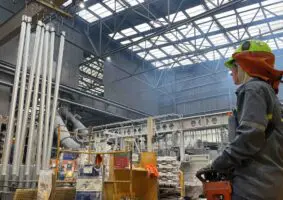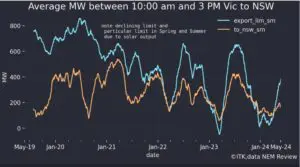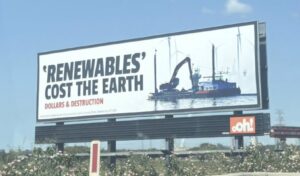An odd thing happened at the Australian Petroleum Production & Exploration Association (APPEA) conference in Perth last week.
David Cooper, the Managing Director of Cooper Energy told a forum that some of the gas industry’s problems were due to poor communication.
“The industry… it’s a little on the nose at the moment,” he said. “We’ve actually gotta get out there and start telling our story… and start to win back some of that sentiment.”
Really? Communications are to blame? Not the incredible advance in renewable technologies? Not the International Energy Agency telling us to stop investing in fossil fuels? Not the fact that the highly potent greenhouse gas is incompatible with a safe climate and must be phased out?
We’ve been bombarded with messages that gas is clean, green, warm and cosy and essential for everyday living for decades. You may remember ‘The Natural Flame’ TV ad from 1979 with women dressed as fumes dancing around a stove top, and a voice-over talking of “pure, clean, instant natural gas”.
The sector’s success in influence and lobbying is clearly evidenced by the federal government’s commitment of nearly $2 billion in gas subsidies.
So, with huge resources, a compliant government, and decades of marketing behind it, the argument that poor communications are to blame for the industry’s woes doesn’t stack up.
APPEA had a budget of more than $8 million in 2019-20 and its expenditure on communications has increased six-fold in three years.
In 2018 it started a social licence campaign with the help of JWS Research. Finding that the cost of living and climate change were the first and third largest concerns of Australians, they set up new messaging and channels to promote gas and play on those emotions.
The two key messages were; gas is good for the economy and jobs, and; gas is a clean energy source.
Bright-r-with-Gas was established to market gas to ‘the persuadable middle’ – people who didn’t think about gas much but could be convinced that it was good. Then, Energy Information Australia was created to push out the industry’s version of facts – to counter messages from environmentalists, ethical investors and the renewable sector.
However, at last week’s conference, JWS Founder, John Scales and APPEA’s Head of Public Affairs, Sarah Browne, revealed that the government’s “gas-fired recovery” and “rebounding concern about emissions reduction” had changed the conversation and sparked unhelpful debate.
“So, indications are at this time we need to pivot, adapt further and probably more proactively in order to maintain the high ground and keep those detractors at bay,” Scales told the conference.
That pivot is to new messaging – “sovereignty and security for Australia.” It will be rolled out across APPEA’s numerous channels and through third party influencers such as friendly media.
This new strategy mirrors the Prime Minister’s narrative of putting “Australia first” in relation to climate policy. Both messages falsely conflate patriotism and the interests of ordinary Australians with the interests of the gas sector. They play into the big lie that we need gas for future prosperity.
But more than that, the underlying message is that change is bad. It is an appeal to fear of the unknown.
Fear of the future was also the undercurrent at the APPEA conference, where a lack of investment, scarcity of new talent and a decommissioning “time bomb” were just some of the threats discussed.
The fact that the sector is resorting to patriotism and fear as arguments for its role in the energy transition is further proof that it’s not grappling with the reality that the role of gas is coming to an end.
The best way for the renewable sector to counter this fear, is communicating a unified, relentlessly positive message about the energy transformation – without fossil fuels.
Belinda Noble is the Founder of Comms Declare and BeNoble Communications










